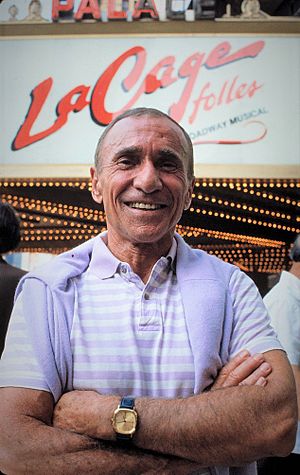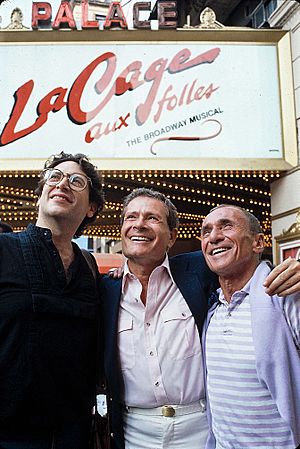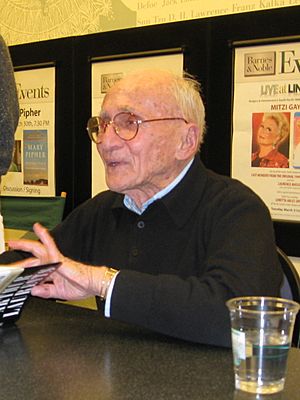Arthur Laurents facts for kids
Quick facts for kids
Arthur Laurents
|
|
|---|---|

Outside of the Palace Theatre, 1983
|
|
| Born | Arthur Levine July 14, 1917 Brooklyn, New York City, U.S. |
| Died | May 5, 2011 (aged 93) Manhattan, New York City, U.S. |
| Resting place | Under a memorial bench in Quogue, New York |
| Occupation |
|
| Language | English |
| Alma mater | Cornell University |
| Period | 1945–2011 |
| Notable awards | 1968 Tony Award for Best Musical – Hallelujah, Baby! 1975 Drama Desk Award for Outstanding Director of a Musical – Gypsy 1977 Writers Guild of America Award for Best Original Screenplay – The Turning Point 1984 Tony Award for Best Direction of a Musical – La Cage aux Folles |
| Partner | Tom Hatcher (co. 1954; d. 2006) |
Arthur Laurents (July 14, 1917 – May 5, 2011) was an American writer and director. He wrote plays, musicals, and movie scripts. His career lasted for over 60 years. He won many awards, including two Tony Awards and a Drama Desk Award. He was also nominated for two Academy Awards.
Laurents wrote scripts for radio shows after college. During World War II, he wrote training films for the U.S. Army. After the war, he started writing for Broadway. He created famous musicals like West Side Story (1957) and Gypsy (1959). He won a Tony Award for Best Musical for Hallelujah, Baby! (1967). In 1983, he directed the musical La Cage aux Folles. For this, he won a Tony Award for Best Direction of a Musical.
Laurents also wrote for Hollywood movies. These include Alfred Hitchcock's thriller Rope (1948) and Anastasia (1956). He also wrote The Way We Were (1973) and The Turning Point (1977). For The Turning Point, he was nominated for two Academy Awards.
Contents
Early Life and Beginnings
Arthur Laurents was born Arthur Levine in Brooklyn, New York. His father was a lawyer, and his mother was a schoolteacher. He grew up in the Flatbush area of Brooklyn. He went to Erasmus Hall High School and then Cornell University.
After college, Laurents took a class in radio writing. His teacher, William N. Robson, helped him get his first script produced. It was a comedy called Now Playing Tomorrow. This success led him to write for other radio shows.
During World War II, Laurents joined the U.S. Army. He was assigned to a film studio in New York. There, he wrote training films for the army. He also wrote plays for a radio show called Armed Service Force Presents. This experience helped him learn about writing for film and theater. Later in life, he changed his last name from Levine to Laurents. He did this to help him get jobs.
A Career in Theatre

Arthur Laurents' first play for the stage was Home of the Brave in 1945. Selling this play to a film studio helped him start his career in Hollywood. But he also kept writing plays.
In 1962, Laurents directed I Can Get It for You Wholesale. This musical helped make Barbra Streisand a star. He also wrote and directed Anyone Can Whistle. Later, he had big successes with the musicals Hallelujah, Baby! and La Cage Aux Folles.
In 2008, Laurents directed a new Broadway version of Gypsy. In 2009, he directed a new version of West Side Story. This version included some Spanish words in the dialogue and songs. He wanted the characters to feel more real.
Writing for Hollywood
Laurents' first experience in Hollywood was difficult. He wrote a script for the movie The Snake Pit (1948). But he did not get credit for his work. This meant he missed out on some benefits later in his career.
After this, Alfred Hitchcock hired him to write Rope (1948). Laurents had to change the British play for an American audience. He also had to be careful because of strict rules about what could be shown in movies. He wrote the script so that the audience would understand the characters without anything being said directly.
Laurents also wrote the scripts for Anastasia (1956) and Bonjour Tristesse (1958). His movie The Way We Were (1973) included some of his own life experiences. He also wrote The Turning Point (1977).
Facing Challenges
During the 1950s, some people in Hollywood were "blacklisted." This meant they were not allowed to work because of their political views. Arthur Laurents was also blacklisted for a time. This happened because a newspaper called the Daily Worker had reviewed his play Home of the Brave.
Because of the blacklist, Laurents could not get a passport. He spent time trying to clear his name. After explaining his beliefs, his passport was given back. Soon after, he was offered a movie writing job. This showed that the blacklisting had ended for him.
Memoirs and Later Life
Laurents wrote several books about his life and career. His book Original Story By Arthur Laurents: A Memoir of Broadway and Hollywood was published in 2000. In it, he shared stories from his long career. He also wrote Mainly on Directing: Gypsy, West Side Story and Other Musicals in 2009. This book discussed the musicals he directed. His last memoir, The Rest of the Story, was published after he passed away in 2012.
Arthur Laurents lived with his partner, Tom Hatcher, for 52 years. Tom Hatcher passed away in 2006.
Death
Arthur Laurents passed away on May 5, 2011, in Manhattan. He was 93 years old. The lights of Broadway theaters were dimmed for one minute in his memory. His ashes were buried next to Tom Hatcher's in Quogue, New York.
Work
Writing
- Musicals
- West Side Story – 1957 – Tony Nomination for Best Musical
- Gypsy – 1959 – Tony Nomination for Best Musical
- Anyone Can Whistle – 1964
- Do I Hear a Waltz? – 1965
- Hallelujah, Baby! – 1967 – Tony Award for Best Musical
- The Madwoman of Central Park West – 1979
- Nick & Nora – 1991
- Novels
- The Way We Were – 1972
- The Turning Point – 1977
- Plays
- Home of the Brave – 1945
- The Bird Cage – 1950
- The Time of the Cuckoo – 1952
- A Clearing in the Woods – 1957
- Invitation to a March – 1960
Directing
- Invitation to a March – 1960
- I Can Get It for You Wholesale – 1962
- Anyone Can Whistle – 1964
- Gypsy – 1974 – Tony Nomination for Best Direction of a Musical
- The Madwoman of Central Park West – 1979
- La Cage aux Folles – 1983 – Tony Award for Best Direction of a Musical
- Nick & Nora – 1991
- West Side Story - 1998 Prince Edward theatre London
- Gypsy – 2008 – Tony Award nomination as Best Director of a Musical
- West Side Story – 2009 Broadway Revival
Additional Credits
- Anna Lucasta (screenwriter)
- A Clearing in the Woods (playwright)
- Invitation to a March (playwright, director)
- The Madwoman of Central Park West (playwright, director)
- My Good Name (playwright)
- Jolson Sings Again (playwright)
- The Enclave (playwright, director)
- Radical Mystique (playwright, director)
- Big Potato (playwright)
- Two Lives (playwright)
- My Good Name (playwright)
- Claudia Lazlo (playwright)
- Attacks on the Heart (playwright)
- 2 Lives (playwright)
- New Year's Eve (playwright)
- Come Back, Come Back, Wherever You Are (playwright, director)
- Caught (screenwriter)
- Rope (screenwriter)
Awards and Honors
| Year | Award | Category | Work | Result | Ref. |
|---|---|---|---|---|---|
| 1977 | Academy Awards | Best Picture | The Turning Point | Nominated | |
| Best Screenplay – Written Directly for the Screen | Nominated | ||||
| 1957 | British Academy Film Awards | Best British Screenplay | Anastasia | Nominated | |
| 1958 | Bonjour Tristesse | Nominated | |||
| 1975 | Drama Desk Awards | Outstanding Director of a Musical | Gypsy | Won | |
| 1948 | Edgar Allan Poe Awards | Best Motion Picture | Rope | Nominated | |
| 1977 | Golden Globe Awards | Best Screenplay – Motion Picture | The Turning Point | Nominated | |
| 1999 | National Board of Review Awards | Best Screenplay (for career achievement) | N/A | Won | |
| 1958 | Tony Awards | Best Musical | West Side Story | Nominated | |
| 1960 | Gypsy | Nominated | |||
| 1968 | Hallelujah, Baby! | Won | |||
| 1975 | Best Direction of a Musical | Gypsy | Nominated | ||
| 1984 | La Cage aux Folles | Won | |||
| 2008 | Gypsy | Nominated | |||
| 1973 | Writers Guild of America Awards | Best Drama – Written Directly for the Screen | The Way We Were | Nominated | |
| 1977 | The Turning Point | Won |
Honors In 2010, a new award was created in his honor: The Laurents/Hatcher Foundation Award. This award helps new American playwrights who write plays about important social topics. The award gives money to the writer and also helps pay for the play to be produced.
See Also
- List of Jewish American playwrights
- List of novelists from the United States
- List of pneumonia victims
- List of people from Brooklyn, New York
- List of playwrights from the United States
- List of theatre directors


